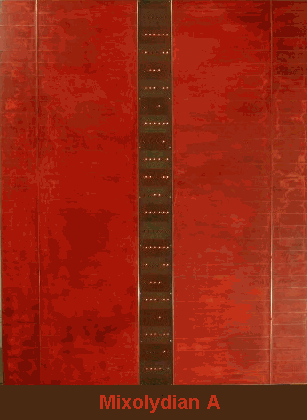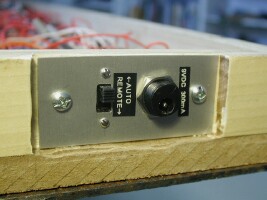|
|
|||
| Product Design | My Artwork | Living Sustainably | |
| Art Engineering | Levitation Kit | Solar Power | Chevy Volt |
| Solar Heating | Thermal Windows | ||
| Contact | About Me | Solar Hot Water | Solar Mower |
|
|
|||
| Product Design | My Artwork | Living Sustainably | |
| Art Engineering | Levitation Kit | Solar Power | Chevy Volt |
| Solar Heating | Thermal Windows | ||
| Contact | About Me | Solar Hot Water | Solar Mower |
|
|
Tom Paiement
"Fret Series #48"
December 2004
Exhibited at:
Arden Gallery, 129 Newbury Street, Boston, Mass.
January 1995

painting dimensions 72 X 60"
Animation shows 8 different light patterns that
represent musical modes
|
|
Tom Paiement had been working on
a series of abstract paintings which represent musical modes. He
wanted to add the dimension of light to the work and had begun to install
LED lamps into one piece when he met me. Fortuitously I live a mile or
so down the road! I helped him to engineer the lighting in that first
piece so that he could run the 40 or so LEDs on a battery pack inside the
painting. For the next painting which has a 6 foot rusted steel panel down the center, he wanted interactivity of 2 kinds. In one mode the painting would automatically cycle through 8 different musical modes (see animation above), and in the other one could directly access each mode from a hand held remote control.
I designed the electronics, and he came to my workshop over several days while I supervised him as he wired all the lights into a grid so that I could wire my electronic circuits to them. He provided me with graphs of the light patterns and I programmed them into a microcontroller chip that I mounted near the bottom of the center section. 3 sub-boards were required at intervals along the painting to address banks of LEDs in 6X8 grids. Each one has a brightness adjustment so that Tom could set the brightness of the lights relative to the ambient light. I also designed and built the custom remote control, and mounted a small panel on the bottom edge of the painting for the switch that changes modes from remote control to automatic display. A power socket allows the painting to run from a small DC adapter. When a new light pattern is displayed the previous one blinks off, then the new one fills in from the top as if the artist's brush was painting them on. |
|
  |
See more of Tom Paiement's work on his web site:
http://tompaiement.com
email Tom Paiement at tompaiement@comcast.net